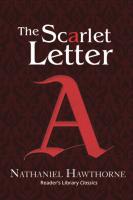
The Scarlet Letter, by Nathaniel Hawthorne, is a historical fiction novel and a stand-alone book.
The Scarlet Letter follows Hester Prynne as she is put on display in her puritanical town for
being an adulterer. This religious society, set in Massachusetts during the time of British
colonization, shames Hester because of the affair she had while she was married. The identity
of the man she had the affair with is unknown, but she has her daughter, Pearl, as a piece of
him. This novel follows Hester as she navigates her shame but also her pride in acceptance of
her actions. The town also gives her a scarlet A to wear to display her sin. Hawthorne uses
many rhetorical devices in order to display contrasts of the evil of human nature but also the
good in it. Follow along as Hawthorne takes you through a seemingly pure town with its share
of secrets.
The Scarlet Letter uses literary techniques, such as parallelism and context-specific diction, to
make the reader feel tied to the text and understand how Hester feels throughout the novel.
The dramatic irony and the revealing of the father of Pearl is very intriguing. It uses detailed
imagery to draw the reader into the society Hester and Pearl live in, where they feel isolated
and secluded from the rest of the townspeople. The book tends to be very predictable in my
opinion because of common tropes we see in other readings that appear in this one. Overall, I
enjoyed the book despite its predictability because it still had elements of surprise.
